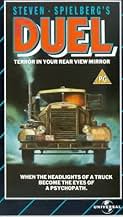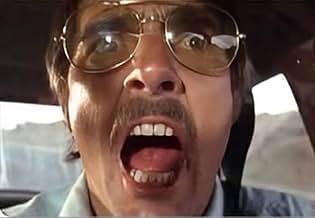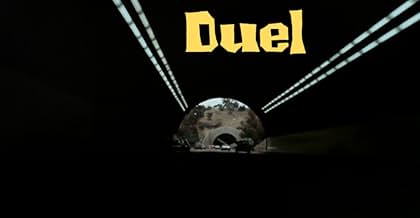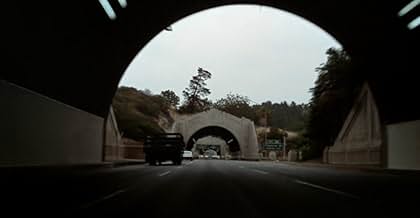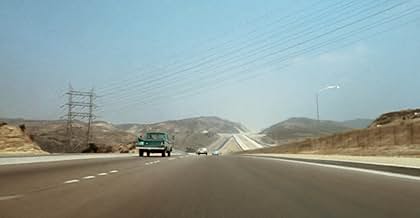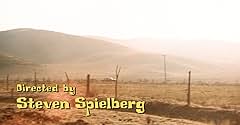Duel
- Téléfilm
- 1971
- Tous publics
- 1h 30min
Un homme d'affaire est poursuivi et terrorisé par le chauffeur maléfique d'un semi-remorque.Un homme d'affaire est poursuivi et terrorisé par le chauffeur maléfique d'un semi-remorque.Un homme d'affaire est poursuivi et terrorisé par le chauffeur maléfique d'un semi-remorque.
- Réalisation
- Scénario
- Casting principal
- Récompensé par 1 Primetime Emmy
- 3 victoires et 5 nominations au total
Carey Loftin
- The Truck Driver
- (as Cary Loftin)
Dale Van Sickel
- Car Driver
- (as Dale VanSickle)
Lance Cormier
- Slow Man in Cafe
- (non crédité)
Chick Sheridan
- Old Man
- (non crédité)
Shawn Steinman
- Girl on school bus
- (non crédité)
Avis à la une
Its just about a road and two vehiciles but Steven Spielberg is a genius who made this simple story a thrilling journey. It was a treat to watch.
The idea of a motorist getting terrorized on the highway feels like it's been done to death in the last four decades, but I'll be damned if "Duel" doesn't feel fresh. You get the idea how this will all play out - 18-wheeler stalks Dennis Weaver, puts the guy through psychological torment, vanishes only to reappear - but Spielberg keeps up that unrelenting dread beautifully with creative use of sound and camera panes around the tanker that really give it size. What's impressive here is that a big rig has such evil personality. Even more impressive is that such a taut thriller was made for TV.
This is obscenely enjoyable stuff.
8/10
This is obscenely enjoyable stuff.
8/10
Although Dennis Weaver is probably best known for his two small screen TV series McCloud and Gunsmoke, there are those that hold out for his career role being the frightened and harassed driver in Duel.
Some years ago I was with two friends and a passenger in a car going on the Thruway in Upstate New York. Some idiot truckdriver thought we had offended him some how and chased us through several miles. We eluded him by going into a service station and driving around until he could not maneuver that big rig. I know exactly what Dennis Weaver was going through.
Weaver plays Mr. Average man on his way home from a business trip when some how he offends a faceless truckdriver whom we never see, but whose power behind that tanker truck we definitely feel right along with Weaver. Unless you're driving a bus you are no position to play turnpike tag with a big rig.
In the end Weaver decides he's so mad he stops being frightened and looks to take him down any way he can.
Weaver's performance is a one man tour de force. As much as Spencer Tracy in The Old Man And The Sea. One not to be missed.
Some years ago I was with two friends and a passenger in a car going on the Thruway in Upstate New York. Some idiot truckdriver thought we had offended him some how and chased us through several miles. We eluded him by going into a service station and driving around until he could not maneuver that big rig. I know exactly what Dennis Weaver was going through.
Weaver plays Mr. Average man on his way home from a business trip when some how he offends a faceless truckdriver whom we never see, but whose power behind that tanker truck we definitely feel right along with Weaver. Unless you're driving a bus you are no position to play turnpike tag with a big rig.
In the end Weaver decides he's so mad he stops being frightened and looks to take him down any way he can.
Weaver's performance is a one man tour de force. As much as Spencer Tracy in The Old Man And The Sea. One not to be missed.
Leave it to prosemaster extraordinaire, Richard Matheson (a favorite of mine and the man Stephen King acknowledges as being his biggest influence), to come up a premise so simple yet so believable and terrifying that the viewer will never look at an eighteen-wheeler the same way ever again...and leave it to cinematic wunderkind, Stephen Spielburg, to do right by Matheson's script and win acclaim in the bargain.
Though some may argue that "Bullit", "Vanishing Point", or maybe even the original "Gone in 60 Seconds" could be called the ultimate car chase movie, "Duel" deserves this designation better because it does something none of the above films can claim. The story literally starts on the road and ends on the road. No location in the entire film is ever out of sight of the highway and, in spite of the brief conversation with the wife, virtually nothing else happens outside the highway. For David Mann (played adequately enough by Dennis Weaver) and the monster truck he's trying to get away from, the road and everything alongside it is their entire universe. Nothing else of importance exists outside of it.
Though it's never mentioned in the film, this would seem to take place on the California highways. When I went out there about eight years ago, I went down roads that seemed to be not too dissimiliar to the ones shown here. They seemed to stretch on forever, no vestiges of civilization in sight for miles. Spielburg uses this setting to great advantage. Being in your car in a crowded city intersection is one thing, but on those highways with nothing but your car and a homicidal maniac in a diesel for miles? The isolation factor that cars naturally produce jumps up a thousand percent. The radiator hose problem made me think of many other times that I had similar troubles with cars I've had. Of course, I never had someone trying to kill me at the time, but...
Anyone looking for drama, character development, or all the other elements that pseudo-critics point out as the mark of cinematic excellence are liable to be disappointed by "Duel". It's what King described in "Danse Macabre" as a Tale of the Hook. It's only purpose is to scare the hell out of you. Damn if it doesn't work. THAT'S the mark of a classic.
Though some may argue that "Bullit", "Vanishing Point", or maybe even the original "Gone in 60 Seconds" could be called the ultimate car chase movie, "Duel" deserves this designation better because it does something none of the above films can claim. The story literally starts on the road and ends on the road. No location in the entire film is ever out of sight of the highway and, in spite of the brief conversation with the wife, virtually nothing else happens outside the highway. For David Mann (played adequately enough by Dennis Weaver) and the monster truck he's trying to get away from, the road and everything alongside it is their entire universe. Nothing else of importance exists outside of it.
Though it's never mentioned in the film, this would seem to take place on the California highways. When I went out there about eight years ago, I went down roads that seemed to be not too dissimiliar to the ones shown here. They seemed to stretch on forever, no vestiges of civilization in sight for miles. Spielburg uses this setting to great advantage. Being in your car in a crowded city intersection is one thing, but on those highways with nothing but your car and a homicidal maniac in a diesel for miles? The isolation factor that cars naturally produce jumps up a thousand percent. The radiator hose problem made me think of many other times that I had similar troubles with cars I've had. Of course, I never had someone trying to kill me at the time, but...
Anyone looking for drama, character development, or all the other elements that pseudo-critics point out as the mark of cinematic excellence are liable to be disappointed by "Duel". It's what King described in "Danse Macabre" as a Tale of the Hook. It's only purpose is to scare the hell out of you. Damn if it doesn't work. THAT'S the mark of a classic.
A brilliant study in minimalist suspense and terror
This film is the perfect example that you don't need a gigantic budget, sound names, great publicity or a little push from someone famous to create a cult classic. All it takes is talent and Spielberg has repeatedly shown us that he has plenty of it. It was filmed in a modest budget, the characters hardly talk and the plot is quite simple: it is the story of a man being chased in a highway by an truck. However it was filmed in such a way that it literally sticks you to the screen, never being boring for one second. The truck (not the driver) is the main protagonist of the story, a menacing character who chases a man to death for no particular reason. It plays marveously with our most intimate fear: the unknown. An absolute must see, a cult classic. this is a unique film.
This film is the perfect example that you don't need a gigantic budget, sound names, great publicity or a little push from someone famous to create a cult classic. All it takes is talent and Spielberg has repeatedly shown us that he has plenty of it. It was filmed in a modest budget, the characters hardly talk and the plot is quite simple: it is the story of a man being chased in a highway by an truck. However it was filmed in such a way that it literally sticks you to the screen, never being boring for one second. The truck (not the driver) is the main protagonist of the story, a menacing character who chases a man to death for no particular reason. It plays marveously with our most intimate fear: the unknown. An absolute must see, a cult classic. this is a unique film.
Le saviez-vous
- AnecdotesAccording to Richard Matheson, he was inspired to write the original short story "Duel" after an encounter with a tailgating truck driver on November 22, 1963, the day that John F. Kennedy was assassinated.
- GaffesWhen Mann approaches the phone booth at the "Snakerama" he says "Odd place for a telephone booth," and gets inside, closing the door behind him. The camera pans to the right slightly, revealing the reflection of Steven Spielberg in the lower right-hand side of the glass panel, wearing what appears to be a blue Hawaiian shirt, glancing up and down at the script in his hands. Behind him, the truck's reflection can also be seen.
- Citations
David Mann: You can't beat me on the grade. You can't beat me on the grade!
- Crédits fousA scene plays out over the credits where David Mann sits on the edge of the cliff throwing stones.
- Versions alternativesFor the German DVD release, the film was entirely redubbed.
- ConnexionsEdited into L'incroyable Hulk: Never Give a Trucker an Even Break (1978)
- Bandes originalesBrush Those Tears from Your Eyes
(uncredited)
Written by Al Trace (as Clem Watts), Oakley Haldeman and James Lee
Published by MCA Music (ASCAP)
Meilleurs choix
Connectez-vous pour évaluer et suivre la liste de favoris afin de recevoir des recommandations personnalisées
Détails
- Date de sortie
- Pays d’origine
- Langue
- Aussi connu sous le nom de
- Dvoboj
- Lieux de tournage
- Le Chene - 12625 Sierra Highway, Agua Dulce, Californie, États-Unis(Chuck's Cafe truck-stop)
- Société de production
- Voir plus de crédits d'entreprise sur IMDbPro
Box-office
- Budget
- 450 000 $US (estimé)
- Montant brut mondial
- 2 544 $US
- Durée1 heure 30 minutes
- Couleur
Contribuer à cette page
Suggérer une modification ou ajouter du contenu manquant



